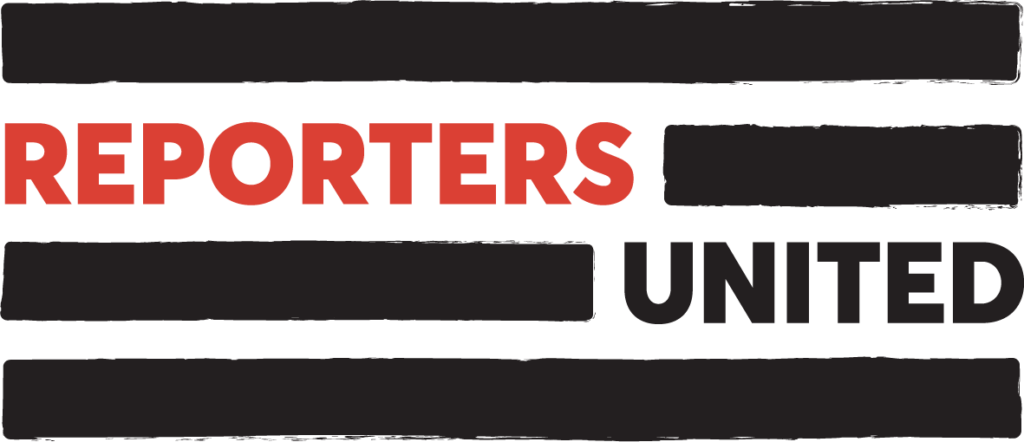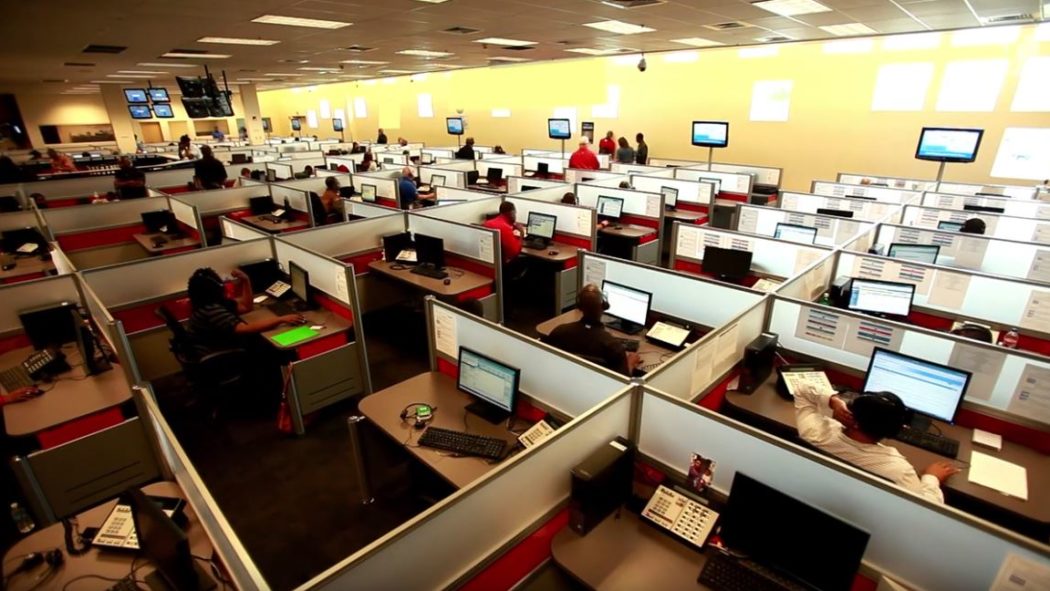The investigation on Teleperformance was produced in co-operation with Investigate Europe. The English version of the story was initially published by Investigate Europe. A French version of the story was also published by Mediapart. Edited by Tansy Hoskins. The story was published in Greece in a three-part series by Efimerida Ton Syntakton.
In an international press release, published on April 6, 2020, Teleperformance made much of its ‘achievements in the fight against Covid-19.’ While the company’s claim that it has ‘worked tirelessly to protect the health and well-being of all employees’ is debatable, their statement is spot on in one regard: Teleperformance plays a ‘key role for economies worldwide in crisis period’ by ‘ensuring business continuity for clients.’
The Paris-based multinational is the biggest contact centre company in the world, employing more than 300,000 people globally. In Greece alone, Teleperformance is one of the biggest employers, with 8,500 employees from more than 105 countries.
Teleperformance might not be a household name but the clients it serves definitely are. In Greece, the company provides multilingual and multi-channel support for tech giants such as Google, Facebook, Apple and Microsoft, and online streaming provider Netflix. Their (undisclosed) client list includes German carmakers such as VW, computer companies such as Dell, HP and Lenovo, Dutch electronics manufacturer Philips, Swiss telecoms provider Salt, as well as Greek banks.

For most of these multinationals, ‘business continuity’ while millions of people were at home, was vital, and Teleperformance contact agents ensured it. But at what price? Teleperformance employees in Greece and beyond were dealt a cruel ultimatum: Keep working in conditions that, according to their own complaints and to the allegations of their unions, were at first overcrowded workplaces which lacked personal protection equipment, and then from home but with strings attached. Or lose their jobs.
“The problems at Teleperformance demonstrate company-wide inability to manage risk and a fundamental disregard for workers’ rights.” – Complaint to the OECD
UNI Global Union is a trade union federation representing ‘more than 20 million workers from over 150 different countries in the fastest growing sectors in the world – skills and services.’ On April 16 UNI Global Union, along with four French trade unions, filed a complaint against Teleperformance under the OECD Guidelines for Multinational Enterprises alleging the company violated the rights of workers to have a safe workplace during the pandemic. This was the first Covid-19-related complaint filed under the OECD’s built-in grievance mechanism.
Christy Hoffman, General Secretary of UNI Global Union, told Investigate Europe: “Teleperformance is now calling their employees ‘heroes,’ but more than empty platitudes, the company should show it values workers by providing safe jobs and secure income during this crisis—and beyond. The problems at Teleperformance demonstrate company-wide inability to manage risk and a fundamental disregard for workers’ rights.”
Nineteen pages of complaints recorded events in ten countries. Four of which are in Europe – France, UK, Portugal, and Greece – showing that workers rights abuses are not exclusively a Global South issue.
More specifically:
- In France, following an inspection at a Teleperformance contact centre in Blagnac (south-west France), the report of Labour Inspection concluded that ‘Teleperformance France is not complying with the health measures taken by the authorities” […] and that employees were exposed “to a serious, grave and imminent risk of harm to their physical integrity’.
- In Portugal, the government shut down a Teleperformance contact centre where five Covid-19 cases had been found because the company had refused to suspend operations.
- In the UK, Teleperformance employees claimed that the company did not allow them to perform social distancing. Employees with Covid-19 symptoms continued to work because the company would not provide them with sick leave.
- In the Philippines, due to a curfew imposed by the government, employees were obliged to sleep at the Teleperformance workplace, in the corridors or under their desks, one next to the other, because if they went home they would be left without pay.
- In Colombia, Teleperformance employees were not provided with PPE (masks, gloves, etc) and had to share headsets. Workers who came forward to protest the company’s practices were dismissed in retaliation.
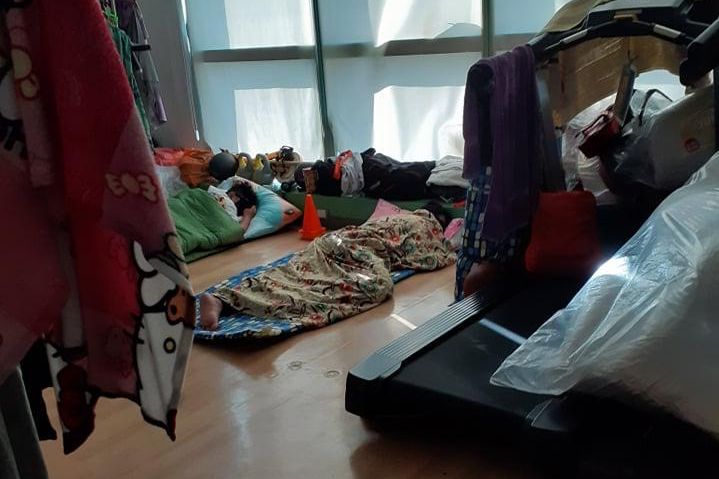
Responding to the UNI complaint, Teleperformance told Le Monde: “We respect the regulations and the local and government directives in each one of the countries” where Teleperformance is present.
Investigate Europe, working in tandem with Reporters United, the first Greek centre for investigative journalism, researched in depth Teleperformance’s labour practices in Greece, conducting interviews with the company, with government and trade union officials. Investigate Europe also talked to Teleperformance employees, both Greek and non-Greek (more than half of Teleperformance staff in Greece are non-Greek), under the condition of anonymity. According to UNI Global Union, Teleperformance does not recognise any unions in Greece – which begs a further question of how a top ten employer in Greece is able to deny people their right to unionise.
Finally, Investigate Europe was able to cross-check, wherever possible, employees’ accounts with documents, email communications and labour contracts that they were asked to sign in the midst of the pandemic.
‘The purpose of this is not to snoop’
In the early evening of Friday 20 March, Teleperformance Greece employees received an email providing information about their transition to remote work. The company would equip its employees with webcams which should remain active throughout their shift. The email written in English said:
“[I]n accordance with the regulations regarding agents working from home, a webcam will be shipped to you over the coming days – The purpose of this is not to snoop, but simply to ensure that our clients data is kept safe while being handled. This is to be plugged in while you are active and, of course be shut down when your shift is over.”

One of the employees contacted us shortly after receiving the email. Kostas* explained why the data security argument was not plausible: “Unlike work at the office, where we were receiving phone calls, at home we communicate with customers via a chat application, with safety guards eliminating any risk of personal data breach. For example, under the new workflow, I am not able to see the client’s card number because the information is encrypted.”

The company’s decision prompted a new wave of reactions from staff. Alerted, one of the reporters of this article put questions regarding the use of webcam to Labour Inspection which notified EODY (the Greek state organisation for Public Health) and the ministries of Health and Labour. On March 23, VICE Greece revealed the company’s plan to use webcams at home.
Faced with bad publicity, Teleperformance seemingly backed down. According to workers, the webcams were not shipped.
A spokesperson for the company, Kimon Antypas, told Investigate Europe that the email in question was not sent by the company’s management but from ‘a supervisor’. In a written reply to Investigate Europe, Teleperformance stated: “There was a misunderstanding of an internal communication regarding video calls that serve only the needs of business communications. But no project inside the company provides for a mandatory use of a camera.”
The company’s spokesperson insisted that the company had ‘never’ intended to use webcams inside employees’ homes.
Faced with bad publicity, Teleperformance seemingly backed down. According to workers, the webcams were not shipped
Investigate Europe is in possession of a document titled ‘Acceptable Terms of Use of Communication Instruments and Means of Electronic Processing’ dated 31st March. It was drafted after the email controversy and after the company decided not to ship the cameras. Articles 68 to 72 lay out the cameras’ terms of use. Article 68:
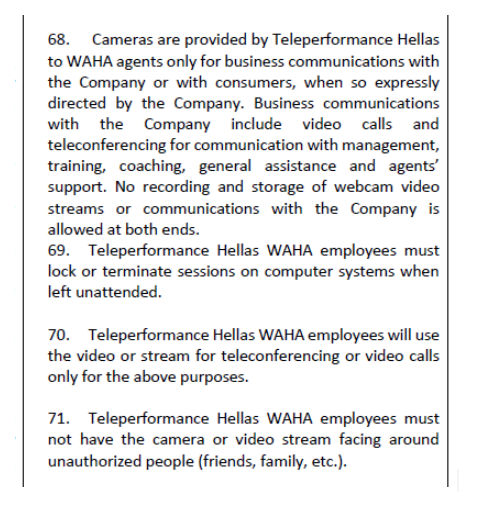
“Cameras are provided by Teleperformance Hellas to WAHA [Work At Home] agents only for business communications with the Company or with consumers, when so expressly directed by the Company. Business communications with the Company include video calls and teleconferencing for communication with management, training, coaching, general assistance and agents’ support. No recording and storage of webcam video streams or communications with the Company is allowed at both ends.”
The terms of use stipulates rules even regarding what the camera is allowed to see: “Teleperformance Hellas WAHA employees must not have the camera or video stream facing around unauthorized people (friends, family, etc.).”
But also from where the screen is allowed to be seen:

Investigate Europe contacted employees who confirmed that they have signed this document as part of their transition to work at home.
Asked by Investigate Europe, Teleperformance declined to comment on these contracts.
‘The Employee consents to home inspection by the Employer during regular working hours‘
The new labour contracts include additional terms such as ‘work area free from distraction, clutter and all background noise’ that employees must meet if they want to stay with the company.
Another of these terms provides that the workers will have to pay themselves for the eventual cost of remote work (internet connection, electricity, cleaning, etc), unless they are remunerated with the minimum wage.

It’s hard to imagine how these new requirements could be met by low-paid employees living in small apartments or with family. And how they could be enforced without webcams or home visits. Which is exactly what the new contracts provide for: ‘The Employee consents to inspection by the Employer during regular working hours and subject to advanced notice to Employee.’
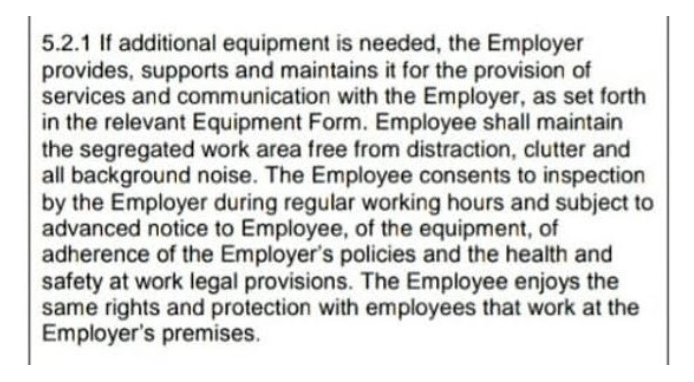
We asked Teleperformance to provide figures regarding employees that left the company during the company’s transition to work from home. Teleperformance did not respond. According to the latest data (Great Place to Work, Best Workplaces 2020), Teleperformance’s annual staff turnover rate, the percentage of employees leaving the company, is extremely high: 32.9 per cent.
March 19: Three quarters of Teleperformance employees still in the office
On April 14, Teleperformance told Investigate Europe that over 8,000, or 95 per cent, of its Greek employees were working from home. The question is – why did it take them so long?
Christy Hoffman, UNI Global Union’s General Secretary, has blasted Teleperformance’s response to Covid-19 as “slow” and “inadequate,” a response that “has put thousands of workers in harm’s way or forced them to go without pay.”
Greece went into full lockdown on March 13, with the Government passing a law on remote working on March 14. The week following the Greek lockdown, not one day passed without new allegations that Teleperformance was not complying with international and national Covid-19 policies.

On March 3, Teleperformance sent employees an email setting out its Covid-19 response, including an extensive list of measures to be taken. In this email, seen by Investigate Europe, there is no mention of working from home.
In another email, again dated March 3, the firm informed employees that ‘Teleperformance Greece is testing if you can work from home,’ asking them to describe their home PC (model, CPU, RAM) and run internet speed tests. In other words, in the beginning of March, the company was still testing the work from home scenario.
On March 16, Greek feminist collective No Tolerance alleged that Teleperformance was ‘being transformed into a hub spreading the Coronavirus, violating fundamental human rights since it continues working with thousands of employees…Some female workers left the office refusing to risk their lives on a daily basis.’
On March 17, a workers’ petition signed by more than 5,500 people, said that Teleperformance was ‘a ticking bomb, as it fails to safeguard more than 8,500 employees and the public health.’ Investigate Europe was able to confirm that the petition was drafted by Teleperformance workers, both Greek and non-Greek.
On March 18, the Athens trade union for employees in the Telecoms and IT sectors (SETIP) notified with a formal complaint the Ministries of Health and Labour for ‘the lack of protection measures’ in the company. Many more complaints went public in the following days.
Kostas*, a Greek worker, told Investigate Europe: “My last day at the office [before moving to work from home] was Friday 20 March. I was terrified not just for my own health but also for my family’s. On one side, the Government was taking unprecedented lockdown measures. On the other hand, I was obliged for several weeks to show up at the office, although it was technically feasible to work from home.”
On March 19 Teleperformance, with a press release published in many Greek media announced a series of measures: cleaning and disinfection of facilities, daily availability of hand and surfaces sanitizers, provision of more space to ensure distancing, screening of body temperatures upon entry in workplace, transition to work from home, fourteen days quarantine for employees arriving from abroad, increased medical staff in the workplace.
On March 27, following questions filed to the Labour Inspection by one of the authors of this article, Labour Inspection notified via email officials at EODY (the Greek CDC) and at the Ministries of Health and of Labour. According to Investigate Europe sources, the Labour Inspection notification alerted the Greek government with top officials debating how to further handle the case.
“My last day at the office [before moving to work from home] was Friday 20 March. I was terrified not just for my own health but also for my family’s.”

Unlike authorities in France and Portugal who acted swiftly to investigate the claims and take measures against the company, in Greece the only government gesture addressed to call centres was simply a ‘recommendation.’ This is despite the fact that call centres host hundreds of people inside a closed space for many hours in conditions that facilitate the spread of viruses.
On March 18, the minister for Civil Protection during the widely watched daily press briefing urged “call centres to keep a distance of two meters between agents.” During the same briefing the minister said: “Businesses must function via remote work. And whenever, due to the business’s nature, remote work is not possible, the companies must work with the absolutely minimum rotating staff.”
Teleperformance took almost a month to comply with this government directive. But throughout March and April, the Greek Government remained mute vis-a-vis the serious public health claims.
On March 19, Teleperformance said in a statement: “‘Already 1,800 employees work from home, with this number growing up on a daily basis, at least by 100.’” In other words, a week after lockdown began, 3 out of 4 Teleperformance employees were still in their workplace.
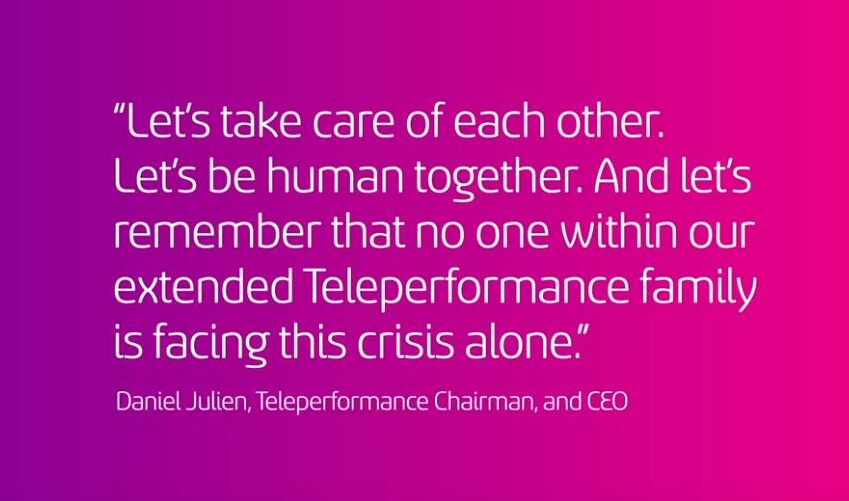
How did other call centers fare?
WIND, a mobile telephone company, stated that by March 3 50 per cent of its employees were working in rotation from home while by March 16 over 90 per cent was working from home. As for Vodafone, the telecoms company, said on March 23 that 90 per cent of its contact centre staff worked from home.
Veronica*, a non-EU Teleperformance employee, says: “By the end of March, Greece was in full lockdown mode in order to avoid the fate of Italy and Spain. And yet, we Teleperformance employees kept going to the office in thousands.”
If a preparation plan had been in existence since January, how can the delay be explained? A possible explanation resides with the role played by Teleperformance’s clients in preventing Teleperformance employees from working from home. Teleperformance declined to answer this question.

Were quarantine rules for international employees followed?
Veronica continues: “We have colleagues from many different countries [105 by Teleperformance’s own calculation], some of which with thousands of Corona cases. I know employees that have come from Britain, Italy, the Netherlands, Germany. I know people that arrived from abroad in these last weeks”.
Veronica’s account coincides with an event narrated in the statement by the Greek feminist collective No Tolerance: ‘In one case, a worker who had just returned from Israel had been aboard the same flight with people who later were found Covid-19 positive. He asked to work from home for two weeks but the company declined.’ If this were true, it would constitute a violation of WHO rules.
In its response to Investigate Europe, Teleperformance denied these claims, assuring that in regard to workers arriving to Greece from abroad, quarantine measures had been observed since the end of February:
‘Teleperformance Greece since mid March does not receive employees from abroad. All employees that arrived until the end of March from abroad (before the full prohibition of travel) were obliged to stay at home for a period of 14 days (a measure in place since the end of February).’
Investigate Europe has seen two emails from Teleperformance to its workers, sent on March 3 and on March 11, which refer to staff that returned to Greece from abroad. In the first email, there is no mention of any Teleperformance policy on quarantine. The second email refers to the quarantine measures but ‘in case of exposure to a confirmed case.’ There is no provision for workers arriving from abroad.
Veronica says: “For those reasons, several colleagues stopped coming to work. I understand them and I would do the same. Unfortunately, I didn’t have the luxury, it was a matter of survival for me. Workers felt they had to choose between a hard day’s work and their safety».
“I know employees that have come from Britain, Italy, the Netherlands, Germany. I know people that arrived from abroad in these last weeks”

The (secret) agreement between the Greek CDC and Teleperformance
It is now public knowledge that in early March, the Greek Government agreed to outsource to Teleperformance the Covid-19 helpline that had, until then, been administered by EODY, Greece’s version of the Centers for Disease Control and Prevention.
Teleperformance agreed to set up and support the helpline for free. The agreement and the cooperation was kept secret until journalists started asking questions, and only then did Teleperformance announce it publicly (51 days after its launch). As for EODY, it still remains mute.
Teleperformance told Investigate Europe that the staff assigned to support the state Covid-19 helpline were ‘paid’. But internal communications seen by Investigate Europe show that, at least in the beginning, the company asked its employees to be helpline ‘volunteers.’
Before it was revealed that Teleperformance was in full charge of the Covid-19 helpline, there were numerous allegations by Greek citizens that the agents in the helpline were untrained and provided false and dangerous guidance. EODY told Investigate Europe that all staff employed in the Covid-19 helpline had received training by its own doctors. Asked by Investigate Europe, both EODY and Teleperformance did not provide any evidence about this training.
Internal communications seen by Investigate Europe show that, at least in the beginning, the company asked its employees to be helpline ‘volunteers.’
The real culprit: The multinationals behind the multinational
In April, the following headline appeared in the Financial Times: Amazon contractors enduring ‘subhuman’ conditions in Philippines. The FT’s focus was on Amazon’s responsibility although the Philippines workers were employed by Teleperformance. While Amazon said it was urgently investigating the allegations, another Teleperformance client, Australian telecoms firm Telstra, accepted part responsibility for its outsourced work and sent a letter to Teleperformance saying that if Teleperformance was “unable to meet the requirements of Telstra’s Supplier Code of Conduct”, Telstra would “require to terminate the services rather than put people’s safety at risk”.
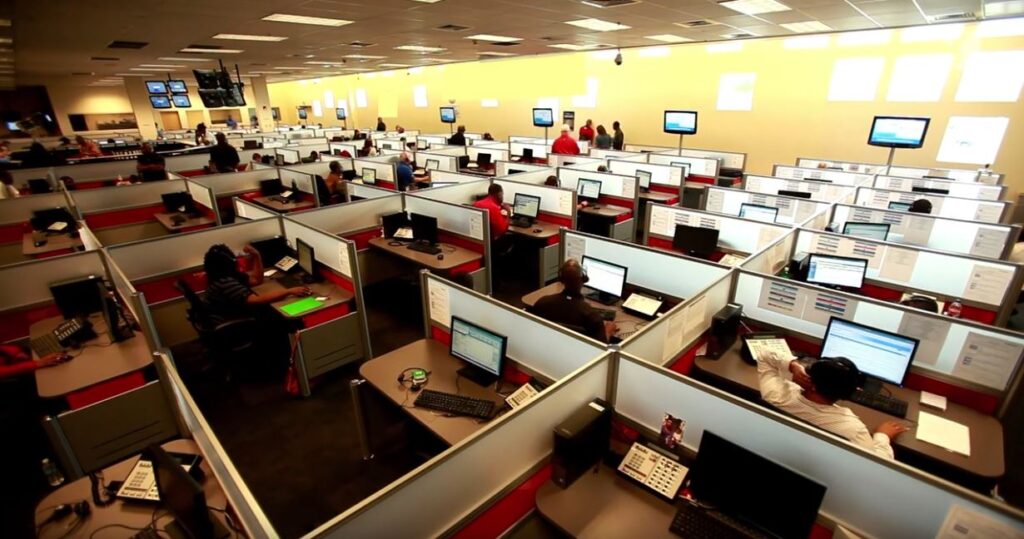
While conditions in Greece and other European countries were far better, the chain of client, contractor, employee remains the same. The client outsources its contact centre work to Teleperformance customer services. Teleperformance calls each client’s department a ‘project’ run by a supervisor. Each employee works on only one project and receives special training. Most importantly, labour contracts signed by Teleperformance employees, and seen by Investigate Europe, mention by name the client this employee is providing services to.
Services provided are tailored to the client’s needs. Joao Cardoso, CEO of Teleperformance Portugal (where Teleperformance is the biggest employer in the country) said: “Each and every client was involved in this process” of addressing the Covid-19 situation.”
This means that the allegations against Teleperformance – for example, that they delayed the work-from-home transition – may have been the result of pressure from their clients. This is confirmed by the Portuguese CEO but also from workers that talked to Investigate Europe. Veronica*, a non-Greek employee, says that “some of the projects allowed work at home faster than others. I think this was due not just to Teleperformance but to the client.”
For example, the infamous email sent from a supervisor to employees informing them that webcams should remain active during their shifts was sent from a supervisor at the project of a US company. What is not clear is whether the US firm was in the know, or if it was their idea in the first place to use webcams to monitor employees. Teleperformance declined to answer any questions regarding their clients. So who are these clients? Teleperformance refused to disclose their client list in Greece but Investigate Europe was able to reconstruct it based on two separate but credible sources. Investigate Europe will send questions to each of the identified clients:
- Did they play a role in Teleperformance’s decisions concerning their subcontracted project during the pandemic, as Teleperformance Portugal CEO’s stated?
- Were they aware of the labour conditions inside their subcontracted project?
*Names of employees have been changed for reasons of anonymity.
Edited by: Tansy E Hoskins
Read the story on our partner media outlets:
Teleperformance: succès boursier, maltraitances sociales — Mediapart
Διαβάστε το άρθρο στα ελληνικά από την Εφημερίδα των Συντακτών:
Μέρος 1ο: Η (μυστική) συνεργασία ΕΟΔΥ – Teleperformance και τα 6 σκοτεινά σημεία της
Μέρος 2ο: Τηλεργασία με καθυστέρηση, μη τήρηση καραντίνας και webcam στα σπίτια
Μέρος 3ο: Οι πολυεθνικές πίσω από την πολυεθνική Τeleperformance
